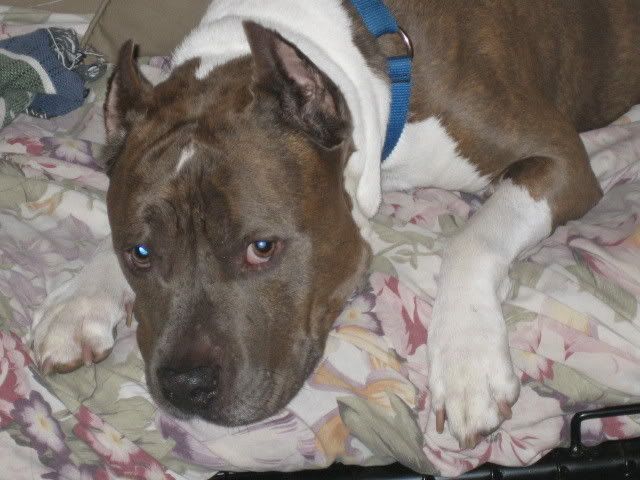Post by michele5611 on Jun 20, 2011 8:07:47 GMT -5
Big ugh to the title....
post-journal.com/page/content.detail/id/586345/-The-Nanny-Dogs-.html?nav=5192
‘The Nanny Dogs’
Programs Help Humane Society Make Sure Dogs Are Ready For Adoption
June 20, 2011
Sue Bobek, Chautauqua County Humane Society community relations coordinator, wants those considering adopting a dog to know help is available to them to make the pet one with which they can bond, no matter what the breed.
A "pit crew" special begins today and runs through July 3 in hopes of getting pit bulls in the society's Pet Adoption Center adopted. Terry Suppa, a local race car driver, has joined with the society to promote pit bull adoptions by reducing adoption fees to $50, about 50 percent of what the fee usually is. Whether adopting the pit bulls or another breed, however, Ms. Bobek said training is available so the pet and owner can find just what they want.
Ms. Bobek said the society takes in a lot of strays picked up by animal control. They are held while humane society staff members try to find their owners. If they cannot be found, the animals are temperament-evaluated. If they pass the test, she said, the animals are put up for adoption.
Those seeking to adopt should meet several criteria. For instance, people with their own homes are sought so the agency does not have to again find a home a second time for the same dog, which may be required when a renter moves into a new location where a landlord does not allow pets. She said adult animals are harder to place, if returned to the society, so it tries to reduce the number it takes back by adopting to home owners and not renters.
The agency also asks the family, including other dogs, to visit with the new pet to do a "dog meet."
"You don't like everyone you meet," she said about people, adding the same is true with dogs. "We want to make sure they are part of the family.
'THE NANNY DOG'
She said pit bulls in particular are sometimes desired to be "a status signal," which the agency does not want. She said the pit bulls are thought of as a signal of toughness and not a family pet.
Despite their stigma, she said, "pit bulls are people friendly." Most bites, she said, are from those tied up outside. She said that leads to them being territorial and aggressive. When people wander by, that can result in a bite. She said, however, pit bulls were once called "the nanny dog." While she would not encourage leaving children with animals alone, she said pit bulls are protective resulting in the name. She said the agency also has pit bull play groups, adding they did not used to have a reputation for being tough, but, rather loyal.
Training is available for any dog from the agency for a discounted fee if adopted there, she said, adding obedience class is offered with a pet behavior specialist. Since pit bulls are a strong dog, she said, it is important they get such training. She said it provides a bond that can be seen when one works with another, including a pet.
"You can't help but love them even more," she said about a pet that is well-trained.
For instance, she said, people get frustrated if they command a dog to come and it runs the other way. Although she said behavior of any animal can't be predicted in all situations, training can help people get to know the pet so they can be aware of its behavior enough to know that taking them for a walk with a lot of people around when they are having an off-day may not be the best idea.
"Dogs have bad days too, just like people," she said.
If there is a bond established between animal and owner, they understand each other.
HEAVEN CAN WAIT
For dogs that do not pass the agency's temperament-evaluation, she said, a program called "Heaven Can Wait," is available. She said it began in November, when the agency sought volunteers to particiate. They are trained on working with dogs that may have problem behaviors. For instance, she said, one was afraid of strangers, another was cat-aggressive, and yet another had a particular fondness for a certain raw hide, meaning if someone not knowing that tried to take it, a problem could result.
The animals are worked with by the volunteers, who then market them to the right family. The dog that was cat-aggressive went to live with a family that had cat allergies.
She said the program prevents animals who may have a problem but are great in every other way from being euthanized. She said the agency has a 93 percent save right and wanted to increase that so the animals with one particular problem could be adopted. Whether the volunteers work at the society or at a foster home, she said, addressing the problem makes the animal more appealing to a family.
Not all of the dogs in the program are pit bulls, she said, adding some have been. She wants people considering adoption to know the dogs of any breed can be worked with if a family is willing to make the commitment that may be necessary.
She said eight to 12 pit bulls are adopted annually, but, she said, there is a stigma to them as some think they are prone to attack. Although Ms. Bobek said the number of bites by pit bulls is low considered to other breeds, when bites do occur they are damaging due to the shape of the breed's jaw.
"It's part of the responsibility of the owner," she said about making any dog including pit bulls well-trained and socialized.
For information on adopting a dog, including the pit bulls for which the pit crew special is ongoing, call 665-2209 or visit www.spcapets.com.
post-journal.com/page/content.detail/id/586345/-The-Nanny-Dogs-.html?nav=5192
‘The Nanny Dogs’
Programs Help Humane Society Make Sure Dogs Are Ready For Adoption
June 20, 2011
Sue Bobek, Chautauqua County Humane Society community relations coordinator, wants those considering adopting a dog to know help is available to them to make the pet one with which they can bond, no matter what the breed.
A "pit crew" special begins today and runs through July 3 in hopes of getting pit bulls in the society's Pet Adoption Center adopted. Terry Suppa, a local race car driver, has joined with the society to promote pit bull adoptions by reducing adoption fees to $50, about 50 percent of what the fee usually is. Whether adopting the pit bulls or another breed, however, Ms. Bobek said training is available so the pet and owner can find just what they want.
Ms. Bobek said the society takes in a lot of strays picked up by animal control. They are held while humane society staff members try to find their owners. If they cannot be found, the animals are temperament-evaluated. If they pass the test, she said, the animals are put up for adoption.
Those seeking to adopt should meet several criteria. For instance, people with their own homes are sought so the agency does not have to again find a home a second time for the same dog, which may be required when a renter moves into a new location where a landlord does not allow pets. She said adult animals are harder to place, if returned to the society, so it tries to reduce the number it takes back by adopting to home owners and not renters.
The agency also asks the family, including other dogs, to visit with the new pet to do a "dog meet."
"You don't like everyone you meet," she said about people, adding the same is true with dogs. "We want to make sure they are part of the family.
'THE NANNY DOG'
She said pit bulls in particular are sometimes desired to be "a status signal," which the agency does not want. She said the pit bulls are thought of as a signal of toughness and not a family pet.
Despite their stigma, she said, "pit bulls are people friendly." Most bites, she said, are from those tied up outside. She said that leads to them being territorial and aggressive. When people wander by, that can result in a bite. She said, however, pit bulls were once called "the nanny dog." While she would not encourage leaving children with animals alone, she said pit bulls are protective resulting in the name. She said the agency also has pit bull play groups, adding they did not used to have a reputation for being tough, but, rather loyal.
Training is available for any dog from the agency for a discounted fee if adopted there, she said, adding obedience class is offered with a pet behavior specialist. Since pit bulls are a strong dog, she said, it is important they get such training. She said it provides a bond that can be seen when one works with another, including a pet.
"You can't help but love them even more," she said about a pet that is well-trained.
For instance, she said, people get frustrated if they command a dog to come and it runs the other way. Although she said behavior of any animal can't be predicted in all situations, training can help people get to know the pet so they can be aware of its behavior enough to know that taking them for a walk with a lot of people around when they are having an off-day may not be the best idea.
"Dogs have bad days too, just like people," she said.
If there is a bond established between animal and owner, they understand each other.
HEAVEN CAN WAIT
For dogs that do not pass the agency's temperament-evaluation, she said, a program called "Heaven Can Wait," is available. She said it began in November, when the agency sought volunteers to particiate. They are trained on working with dogs that may have problem behaviors. For instance, she said, one was afraid of strangers, another was cat-aggressive, and yet another had a particular fondness for a certain raw hide, meaning if someone not knowing that tried to take it, a problem could result.
The animals are worked with by the volunteers, who then market them to the right family. The dog that was cat-aggressive went to live with a family that had cat allergies.
She said the program prevents animals who may have a problem but are great in every other way from being euthanized. She said the agency has a 93 percent save right and wanted to increase that so the animals with one particular problem could be adopted. Whether the volunteers work at the society or at a foster home, she said, addressing the problem makes the animal more appealing to a family.
Not all of the dogs in the program are pit bulls, she said, adding some have been. She wants people considering adoption to know the dogs of any breed can be worked with if a family is willing to make the commitment that may be necessary.
She said eight to 12 pit bulls are adopted annually, but, she said, there is a stigma to them as some think they are prone to attack. Although Ms. Bobek said the number of bites by pit bulls is low considered to other breeds, when bites do occur they are damaging due to the shape of the breed's jaw.
"It's part of the responsibility of the owner," she said about making any dog including pit bulls well-trained and socialized.
For information on adopting a dog, including the pit bulls for which the pit crew special is ongoing, call 665-2209 or visit www.spcapets.com.








 I look forward to learning much here
I look forward to learning much here